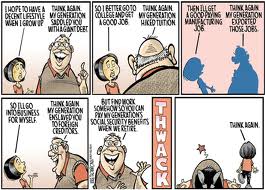17 Nov Generational Politics
 Inspired by a string of generational reports from the PEW research center, NPR has recently focused on generational differences in politics and economics. All the stories in their “Generational Politics” segment follow the four generations that currently constitute the voting population. The series looks at typical economic situations given the economic downturn, political leanings, value systems and their projected political sympathies in the 2012 election.
Inspired by a string of generational reports from the PEW research center, NPR has recently focused on generational differences in politics and economics. All the stories in their “Generational Politics” segment follow the four generations that currently constitute the voting population. The series looks at typical economic situations given the economic downturn, political leanings, value systems and their projected political sympathies in the 2012 election.
The relationship between age and voter turnout has intrigued political scientists at least since 1960. Two rivaling theories are set out to answer the question of age and political alignment. The answer is likely to be a little bit of both.
The cohort theory suggests that people’s political alignments are shaped according to ones ‘generational location’. Sociologist Karl Mannheim developed the generational theory as early as 1923. He inferred that people’s overall value systems and political leanings are thought to be anchored by events and economic conditions experienced in the younger years when political opinions usually are formed. He inferred that people’s overall value systems and political leanings are thought to be anchored by events and economic conditions experienced in the younger years when political opinions usually are formed. So the generation that came of age during the Eisenhower years is shaped by this time period and differ substantially in their views on for instance the role of the U.S. in the world from those whose political preferences were shaped after 9/11.The theory has been used to explain why political events in the 50s and 60s inspired educated youth to organize around the civil rights movement in the sixties whereas the younger ‘boomers’ were more inclined towards individual fulfillment.
But this theory has failed to explain why voters seem to grow more conservative as they grow older. Enter the lifecycle theory. This theory postulates that people’s voting tends to shift according to their needs reflected by their age. As people grow older and more established they acquire more wealth. Wealthier constituents tend to favor small governments as they believe themselves to be the involuntary net givers in a more socialized system. Also they have grown more rigid in their views and cultural endorsements, which explains their typical slant towards social conservatism. Cynics might even add a tendency to view environmental protection – usually a liberal issue – with skepticism and/or indifference as they are less likely to suffer personally from the long term effects of environmental harm in their own life time.
The Pew polls seem to confirm both theories. Political leanings seem to follow a wavy pattern with right-wing periods alternating with left-wing periods about every other or ever fourth election cycle. The Boomers, famous for their left-wing leaning civil protests decades ago, are still more left-leaning than the notoriously disaffected, individualistic Gen-Xers following them. But not by much! The Boomers have far more in common with the Republican leaning Gen-Xers than the Democratic leaning Millennials. That probably would not have been the case forty years ago.
The 70+ aged Silents constitutes the most conservative generation in the country right now. Not surprisingly, they are also the ones who have weathered the economic downturn the best, mainly due to earlier increases in property values and a large younger generation (boomers) funding existing retirement plans. Neither is it hardly a surprise that the only two issues where they tend to be more liberal is on Medicaid and Social Security, entitlement programs from which they are the main beneficiaries. But this generation is also the angriest! They’re the generation most likely to blame the economic downturn on the current president. The most liberal on the other hand is the Millennials. Together with the Gen-X’ers they’ve been set back financially several decades and will probably never achieve the same living standards their older relatives enjoyed in their lifetime. But despite their more recent disappointment with Obama, who they massively supported in 2008, they are the most optimistic and least likely to vote him out in 2011.
So is maybe political alignment and re-alignment linked to life cycle mood swings? Are cantankerous people less likely to believe in large society-wide solutions? Do the older generations view their liberal children and grandchildren as naïve daydreamers who don’t realize that the house they are standing in is burning down? Well, then maybe it’s time for the Millennials and post-Millennials to ask who or what are burning down the house. Something tells me this is what the Millennial dominated Occupy movement is all about.
Image: ButterFunk


Sorry, the comment form is closed at this time.